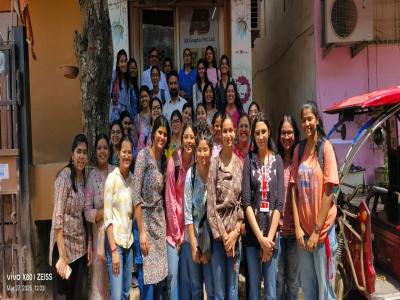Industry visit to "Gaukriti" and Printing Press

Name of the Department: Applied Arts & Sculpture
Name of the Event/Activity/Workshop/Seminar: Industry Visit to Gaukriti and Printing House
Date: March 27, 2025
Venue: 22 Godam, Jaipur
No. of Participants: 27 students and 2 faculty members
The students of Applied Arts Semester VIII, Department of Applied Arts & Sculpture visited various printing and paper-related industries as a part of their academic curriculum. The purpose of this visit was to gain firsthand knowledge of the printing industry, understand various printing techniques, and observe the real-world applications of their theoretical studies. This hands-on learning experience was designed to deepen their knowledge of offset printing & digital printing, covering everything from design to final production.
The visit included multiple stops at different industries, each specializing in unique aspects of printing, packaging, dye-cutting and paper production:
Jain Lamination & Dye Cutting Works
- Learned about the offset printing process.
- Observed the manual lamination process through screen printing and digital lamination through machines.
- Understood the dye-cutting process and the use of textured rollers for giving special effects to the packaging after printing.
Radha Radhe Sales
- Gained knowledge about the laser cutting process and its applications.
Paper Point
- Learned about different sizes and types of paper used in the printing industry including coated and uncoated paper, bond paper, gloss and matte finishes, cardstock, and specialty papers tailored for different printing applications.
Alok Enterprises
- Understood the process of printing on different surfaces such as flex, vinyl, cloth, and glass.
Gaukriti
- Learned about the eco-friendly process of making paper from cow dung.
- Observed a range of sustainable products created from cow dung.
Vanshika Creation
- Observed manual and semi-automatic offset printing processes.
- Saw demonstrations of one-color and four-color printing machines.
- Learned about the digital printing and plate-making process.
- At the end of the visit, the students received certificates from the owner of Vanshika Creations.
The visit offered an excellent opportunity for students to closely observe the entire printing process. They began by exploring prepress activities such as design preparation, layout arrangement, color separation, and the creation of printing plates. This highlighted the importance of carefully setting up artwork for accurate printing output.
Students observed the plate-making process, where images were transferred onto the plates using specialized machinery. They also had the opportunity to watch the offset printing press in operation, gaining insights into how ink is applied, transferred from the plate to a rubber blanket, and ultimately printed onto paper. The significance of maintaining smooth ink flow and precise alignment was emphasized. Additionally, they examined the functionality of single-color printing machines and four-color (CMYK) printing machines.
Students also learned about various lamination techniques, such as Aqua Lamination and UV Lamination, and observed the functioning of both digital printing machines and UV printing machines. They further explored the workflow of laser cutting machines.
A session on paper types and sizes provided students with knowledge about different kinds of sheets used for various printing and packaging needs. The visit also included a stop at the office of Gaukriti, the inventors of cow-dung paper.
Observing industry professionals at work allowed them to bridge the gap between academic learning and real-world applications. Additionally, gaining insights into different types of printing, materials, and finishing techniques broadened their knowledge base, helping them to make more informed decisions in their future projects. The visit also introduced them to emerging trends and sustainable practices within the printing industry, which are essential for modern-day designers. Overall, this hands-on experience was invaluable in strengthening their skills, improving their design approach, and preparing them for careers in applied arts and printing-related fields.

